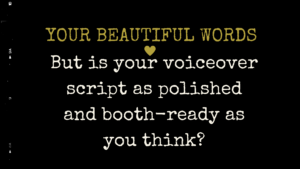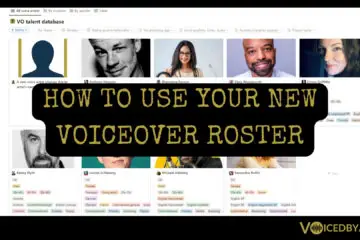Is your voiceover script as polished and booth-ready as you think?

Will that script trip off the voiceover artist’s tongue? Or will it trip them up? Perhaps there’s even a line for which the director is going to need countless retakes because something indefinable isn’t quite right in the delivery. Perhaps that’s not the voice artist’s fault. Is that voiceover script as polished and booth-ready as you thought? As the voice artist, though, I should surely be voicing scripts, not voicing opinions or offering critiques. Quite right. And yet… wait.
From time to time in voiceover forums, some variation on the following question arises: what should I do if I see a mistake in the script? Mistakes creep in far more often than you might realise. Typos. Words lost or added during editing. Punctuation that prompts uncertainty.
Most scripts make their way past multiple pairs of eyes before they reach the recording booth. You’ve drafted, deleted, redrafted, tweaked, considered, shared it around the team, tweaked a couple more times and finally achieved script sign-off. Which might make it surprising that so many approved scripts fail to fulfil their potential.
Except that … I know that writing isn’t easy. Scriptwriting arguably more challenging still. I know this well. Before and alongside my voiceover work, I’ve spent the best part of two decades working as a copywriter, writing for almost every sector. Everything from ghost-writing opinion pieces for experts in their fields to speeches for C-suite directors of multinationals, up to and including writing and editing explainer video scripts. I’m used to trying to condense complex concepts and chains of thought into chunks, into digestible, moreish morsels meant to persuade, to convince, to compel.
That doesn’t mean I want to change your script at all. No voiceover artist does. We only want two things: to make you, the client, happy, and a script that makes it really, really easy to do that. I’m just establishing that I can see things from your end of the process, as well as from the voice actor’s place behind the acoustic glass.
And even the voiceover who has no known talent for writing or editing may well spot something that’s been missed.
Script issues to look out for
- Typos. So easily missed. And sometimes not easily discerned as such; sometimes that typo just creates a different word that kind of works. While minor pick-ups for script errors are often included within any agreed voiceover rates, nobody wants the trouble.
- Inadvertent tongue-twisters. Voiceover artists use real tongue-twisters to warm up with, to get their mouths feeling elastic and agile enough to tackle the wordiest of reads. From time to time, though. tongue-twisting phrases find their way into scripts unintentionally. Where alliteration and lyrical writing can sound just perfect, some combinations of words defy a clean first-time read. The solution: read your script aloud, as if you were the voice artist. Anything hard to enunciate clearly at a good speed? Consider rewriting it.
- Punctuation. Its primary purpose in writing is to clarify meaning, removing ambiguity. But writing for reading and writing for reading aloud are two different skills. In the booth, your punctuation can make a session easy or tricky. We’re going to add our own. Because we need to breathe. Look to keep clauses relatively short. That’s sometimes far from simple when you’re explaining something technical or drawing comparisons. Again, reading aloud allows you to test where the breathing points come without affecting the emphases that you want. If in doubt, go short. More short clauses or more short sentences. A bit like writing for a younger audience or one for whom English is not their first language.
- Repetition. Used in the right way, repetition is powerful. When it appears by mistake – which most commonly happens after multiple edits or when somebody decides they don’t like a word you’ve chosen and defaults to one you use in the next sentence – it reduces emotional impact and persuasive power. It can also affect the potency of a read. Even subconsciously in the voice artist’s mind. Because it becomes a jarring sticking point. Scour your script for words that crop up too often or in close proximity to one another.
- Abbreviations and acronyms. Take the time to define how you want something read. The year 2020 can be read in several ways: “Twenty-twenty”, “Two thousand and twenty”, “The year from hell”.
- Company names or unusual words. Spell them out phonetically in the script notes. That’s even true of words like “schedule”. Correct UK pronunciation is “shed-yule”, US pronunciation is “sked-yule”… yet plenty of Brits use “sked-yule”. Does it matter to you? Does it matter to your target audience? Does it matter in the great scheme of things? Nope. But – and particularly if it’s in the middle of a tongue-twisty, lengthy sentence – it matters to the time you’ve booked in the recording studio, the decisions of the director, the work of the audio engineer and the efforts of the voice artist. If there’s more than one way to say something, be specific.
- Tone. There isn’t a VO artist in the world who hasn’t been given the brief “light and conversational”, yet before them squats a script stuffed with corporate jargon and phrases nobody uses in conversation. People buy from people and people seldom speak with unnatural formality. Imagine telling someone you’ve just met the same story that your script outlines. If it doesn’t sound at all alike, perhaps the script is worth revisiting with that in mind. Because if that new acquaintance’s attention might wander, so might that of your audience. A talented voice artist can make unnatural scripts sound remarkably natural… but it’s so much easier when the writing feels real.
- Length and timing. The average reading-aloud speed is around the 140-150 words-per-minute mark. If you want 400 words spoken for a two-minute video, you’re going to get a sacrifice on tone and clarity. Get a stopwatch out and test every script. If it’s tight, a professional voiceover artist will probably be just fine. But you’ll get a read that matches what you’re hoping for if there’s room to breathe and let words settle for a beat. A little more time spent editing and testing script timing will pay off in the voiceover delivery.
A request
Please, don’t be upset by questions and don’t be sensitive about your script. I know you probably aren’t. Most people want an error picked up or an improvement made, even if it is frustrating that it slipped through. Some voiceover artists consider it a prickly predicament when they find something in a script that isn’t wrong enough to be classified as a mistake, but which creates a slight sticking point. Do they stick their head above the parapet and highlight it? In most cases, I will, but that comes of the confidence gained not just through years of voiceover work, but years of editing and improving the writing of other writers as well as people with big job titles.
If you are asked a question, please don’t take it personally or judge the voice artist. They just want your words to do everything you hoped they would. And a script tweak before or during a voiceover session is a whole lot cheaper than paying for a second session when something isn’t quite right.
For a more light-hearted take on this issue, listen to the quick Q&A below. It’s from an interview I did for the Too Stupid To Quit podcast, where the guest is presented with challenging – and quite extreme – dilemmas when being directed. Follow Too Stupid To Quit on Instagram and catch up with all their interesting and at times belly-laughingly funny interviews by searching your favourite podcast provider. |
One last check
Have you done a sensitivity-check on your script? Is there anything in there with the capacity to offend or damage your brand? It’s rare, but not unheard of. Even people who consider themselves hugely empathic can overlook a word or phrase or entire idea that has the potential to harm. I think this is a good example of the need for a sensitivity-check. Perhaps you disagree. But will your customers?


